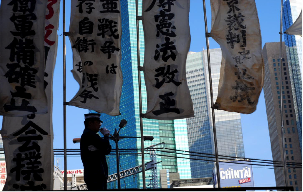Event

Amid questions about a broader shift to the right in Japanese politics, this paper considers the view from the street: how have rightist activists retooled to engage the changing terrain of civil society, from the antinuclear movement to recent but virulent forms of anti-Korean and anti-Chinese activism, in the context of Abe’s second coming? A core characteristic of the postwar Right is self-definition by opposition political programs oriented around “anti” stances. This antagonistic sentiment echoes daily from armored vans and megaphones across the Japanese archipelago, not infrequently punctuated by violence. In the 1990s, however, the polarity of reactionary stances that oriented rightist activism was disturbed by events including the end of the Cold War, the decline of domestic leftist groups, the death of the Showa Emperor, legal changes affecting rightists’ ability to secure funding, and the extended economic malaise. Against this backdrop, the popular groundswell of post-3.11 anti-nuclear activism and its troubling twin, the rise of anti-foreign activism led by “new conservative” groups such as the Zaitokukai, have significantly remapped the terrain of Japanese civil society. Rightist street activism is navigating these emergent phenomena in Japan by employing novel and decidedly national arguments to renew the ideology of the Right even as it rejects in turn both the nuclear state and the anti-nuclear Left, and both anti-foreigner activism as well as “bad” foreigners. But if an anti-establishment stance is core to the Right, how have they assessed Abe’s return, a premier critiqued by many as representing a nationalist turn for Japan?
Nathaniel M. Smith is Assistant Professor of East Asian Studies at the University of Arizona. A cultural anthropologist specializing in Japan, Smith’s research focuses on nationalism, social movements, and organized crime. His current manuscript is an ethnography of the moral and social worlds of Japan’s prominent rightist activist groups that traces their trajectory from the early post-WWII years, beyond the Cold War, and into the contemporary terrain of post-3.11 civil society. He maintains broad interest in the history of Japan anthropology, urban studies and inter-Asian migration, and sound and visual studies of Japan. Prior to joining the faculty of the University of Arizona, Dr. Smith spent two years serving as Japan Foundation Faculty Fellow in the Department of East Asian Languages and Cultural Studies at the University of California, Santa Barbara.